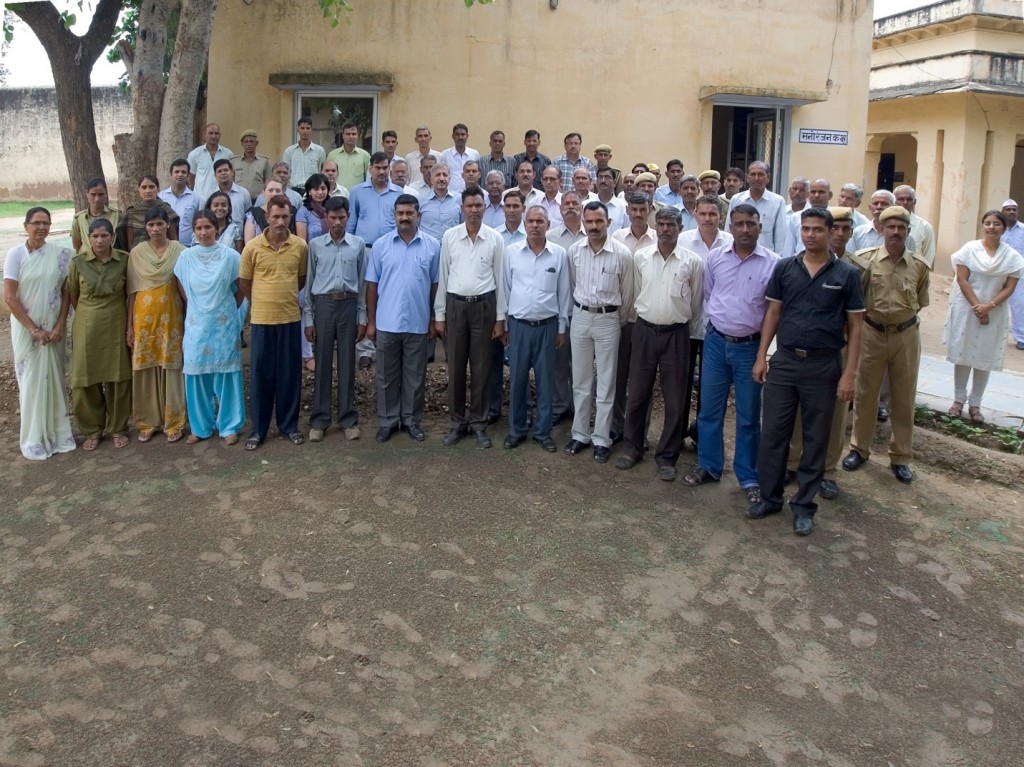

A total of 50 warders and head warders from District Jail Alwar, Rajasthan participated. A retired IG, from Rajasthan Prison Shri R.K. Saxena stressed that all those who are in jail are also human and deserve the humane treatment. Though the warders are at the lowest rank in jail administration but they have maximum contact with the accuseds and prisoners hence they have maximum responsibility for reformation and conflict management between them and the inmates. He stressed that prisoners are human beings, not case files. The court has punished them once; and they are not supposed to be punished daily. It’s in the hands of Prison Staff to inspire the inmates and spark a change in their lives.
An Exercise about “Your perspective of Prison” was done by circulating a comprehensive list of various elements associated with the concept of a jail like walls, bars, grills, handcuffs, beating, torture, monotonous food, restrictions on access to family and friends, ban of use of mobiles and various restrictions imposed on Inmates was conducted with a view to know what they visualize about the same.

Mr. T.S. Madaan, a motivational Speaker focused on complete personality development of warders and stress management. He generated enthusiasm in the participants and made an attempt to de stress their minds. He emphasized that one should control their emotions such as anger, fear, anxiety, happiness, stress before they control oneself. According to him “We all have the controls with us. He said that lion is a dangerous animal, he eats other animals. But still we don’t hate him as it is his nature. Mr. Madaan touched upon the use of effective communication skills and emphasized that listening is more important than speaking. It is important to come down to others’ level to understand them and only then we can bring them to our level. We have to put ourselves in other’s shoes to overcome the communication barriers. The idea of this session was to make the staff understand the improtance of effective communication with inmates.

Mr. Ajay Verma, Advocate and Fellow of International Bridges to Justice along with Mr. Anshumaan Saxena, An advocate from Jaipur in the last session of the day discussed the basic legal provisions of bail and parole with the warders. Mr. Ajay said that about 65% of prison population in India is under trials and most of them do not know their rights and duties. It is the duty of the warders and Head warders as guardian to inform accused about their right to bail and parole. Mr. Anshuman told the participants about Indian Penal Code, Criminal Procedure Code and Indian Evidence Act in brief. The participants were requested to study basic and common provisions of Criminal procedure and Penal Code so that they have knowledge about bailable and non-bailable offences. Which will help them to inform the accused about their right to Apply for bail. Often it is seen that the accuseds do not know their right to get Bail in case the Investigating Agency fails to file Charge-Sheet (Final Investigation Report).

The Second day began with felicitation of Mr. Omendra Bhardwaj, Director General, Rajasthan Prisons, who was the guest of honor. Mr. Omendra Bhardwaj, in his opening address said that the complex jail organization is not run by DG or Superintendents or jailors, but it is run by warders and head warders. He emphasized that the responsibility of reformation and rehabilitation of prisoners ultimately lies on the shoulders of warders who can bring them dignity and happiness. The purpose of jails is to reform a person so that he is a better human being when he goes back to society. It is duty of courts to punish the offenders, but jail staff is not supposed to punish them daily. He suggested them to empathies with the inmates and never to crush their self-respect. The
attitude, communication skills and body language of jail staff matters a lot while dealing with the most ignored and vulnerable section of society. Prisoners have a right to reform.

The next session conducted by Mr. Ajay Verma, Advocate and Fellow of International Bridges to Justice and Ms. Sugandha, Advocate and Consultant of CHRI who enlightened the participants about various issues in a jail in a very innovative way. With the help of a video clip, they told the jail staff best ways to help people lodged in jails who are without lawyers, what to do if the family doesn’t know that they are in prison, how to deal with the most vulnerable like mentally ill prisoners, juveniles etc. It was an activity based session where all the warders were divided in the groups of five. then they were instructed to discuss the changes they want to see in their prison and best possible practices they want to follow. After that each group presented their findings in a creative manner in form of writings or drawings. The various suggestions that came were to keep the prisoners occupied, to listen to the inmates who are depressed, informing their families. The warders thought that they should take initiative to increase the reliability between convicts and jail staff and work as their legal parents. Some also suggested the ways to keep the premises green and environmental friendly.


The workshop was ended with the panel discussion chaired by Mr. Bhardwaj, Director General Rajasthan Prisons, Mr. Rakesh Mohan, Jail Superintendent, Alwar Prison and Mr. R. K. Saxena, Former I.G. Rajasthan Prisons. This exercise was an attempt to remove communication barrier between the Prison Staff and The Senior Officer of Prison Authority.